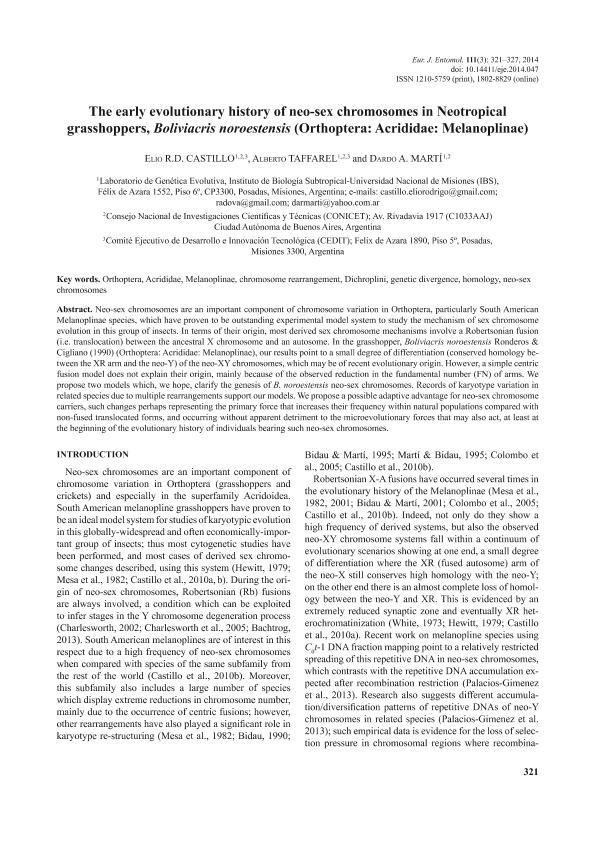Artículo
The early evolutionary history of neo-sex chromosomes in Neotropical grasshoppers, Boliviacris noroestensis (Orthoptera: Acrididae: Melanoplinae)
Fecha de publicación:
07/2014
Editorial:
Czech Academy of Science
Revista:
European Journal Of Entomology (ceske Budejovice)
ISSN:
1210-5759
e-ISSN:
1802-8829
Idioma:
Inglés
Tipo de recurso:
Artículo publicado
Clasificación temática:
Resumen
Neo-sex chromosomes are an important component of chromosome variation in Orthoptera, particularly South American Melanoplinae species, which have proven to be outstanding experimental model system to study the mechanism of sex chromosome evolution in this group of insects. In terms of their origin, most derived sex chromosome mechanisms involve a Robertsonian fusion (i.e. translocation) between the ancestral X chromosome and an autosome. In the grasshopper, Boliviacris noroestensis Ronderos & Cigliano (1990) (Orthoptera: Acrididae: Melanoplinae), our results point to a small degree of differentiation (conserved homology between the XR arm and the neo-Y) of the neo-XY chromosomes, which may be of recent evolutionary origin. However, a simple centric fusion model does not explain their origin, mainly because of the observed reduction in the fundamental number (FN) of arms. We propose two models which, we hope, clarify the genesis of B. noroestensis neo-sex chromosomes. Records of karyotype variation in related species due to multiple rearrangements support our models. We propose a possible adaptive advantage for neo-sex chromosome carriers, such changes perhaps representing the primary force that increases their frequency within natural populations compared with non-fused translocated forms, and occurring without apparent detriment to the microevolutionary forces that may also act, at least at the beginning of the evolutionary history of individuals bearing such neo-sex chromosomes.
Archivos asociados
Licencia
Identificadores
Colecciones
Articulos(CCT - NORDESTE)
Articulos de CTRO.CIENTIFICO TECNOL.CONICET - NORDESTE
Articulos de CTRO.CIENTIFICO TECNOL.CONICET - NORDESTE
Citación
Castillo, Elio Rodrigo Daniel; Taffarel, Alberto; Marti, Dardo Andrea; The early evolutionary history of neo-sex chromosomes in Neotropical grasshoppers, Boliviacris noroestensis (Orthoptera: Acrididae: Melanoplinae); Czech Academy of Science; European Journal Of Entomology (ceske Budejovice); 111; 3; 7-2014; 321-327
Compartir
Altmétricas




